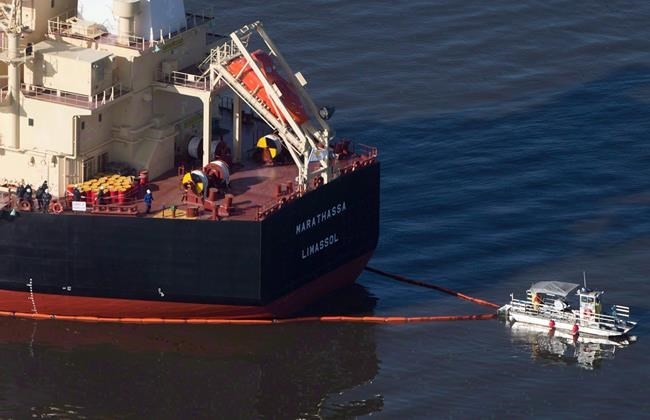 One consequence of Kinder Morgan hitting the brakes on its Trans Mountain pipeline expansion: Construction of six new spill-response bases, including four on Vancouver Island, was quietly placed on hold this week.
One consequence of Kinder Morgan hitting the brakes on its Trans Mountain pipeline expansion: Construction of six new spill-response bases, including four on Vancouver Island, was quietly placed on hold this week.
The bases — on the Saanich Peninsula, at Beecher Bay, Nanaimo, Port Alberni-Ucluelet and two on the Lower Mainland — are directly linked to the Kinder Morgan work. Regulators say they must be up and running several months before the taps on the twinned pipeline open.
Construction was supposed to begin this summer, but those plans were frozen after Kinder Morgan announced Sunday that it was cancelling all non-essential spending while it seeks “clarity” on the project’s future.
That might trouble those who, during the course of the Kinder Morgan tug of war, have come to believe the West Coast could use a more robust spill-response capability regardless of whether oil tanker traffic increases. No, replies the company charged with the task, we’re in good shape to meet existing risks.
When disaster strikes, it is up to the Western Canada Marine Response Corp., an industry-funded outfit whose roots go back to the 1970s, to react. Operating out of bases in Duncan, Burnaby and Prince Rupert, WCMRC also has vessels anchored in the Victoria and Nanaimo harbours, plus caches of equipment dotted around Vancouver Island.
Those existing assets are to be augmented by $150 million worth tied to the Trans Mountain work: the six bases, 43 new vessels and 135 jobs. About 100 people will be employed at the Vancouver Island bases.
On the Saanich Peninsula, the plan calls for office and warehouse facilities on Victoria International Airport property, with a skimming vessel, landing craft and workboats moored at Sidney’s Van Isle Marina. (Mini-barges, used to transport oil from skimming vessels to larger barges, have been parked there for a year or two.) The Sidney operation would be staffed around the clock, 365 days a year.
The Nanaimo location, replacing the one in Duncan, would house a variety of vessels and function as the main repair shop and training centre.
The one at Beecher Bay would host a skimming vessel, a coastal response vessel, landing craft and workboats.
Ucluelet and Port Alberni would be treated as a single base covering the west coast of the Island. “That will be an important base,” WCMRC’s Michael Lowry said. Will, that is, if it gets built. Workers are finishing up some wharf resurfacing at Port Alberni, but construction of the base itself — and the other bases — is on hold.
Lowry said the suspension of construction doesn’t mean planners have put down their pencils. Engineering work is proceeding, as is the hiring process. The reality, though, is that the bases are tied to a pipeline whose fate is uncertain.
The fate of the bases will interest a lot of people, as one of the byproducts of the pipeline debate — which is largely a debate over marine safety — has been increasing awareness of how much commercial traffic passes our shores. With or without Kinder Morgan, tankers represent just a tiny fraction of the shipping through local waters.
In fact, the fuel spills we have seen came from other types of vessels. In 1991, fuel oil spread as far as Oregon after the Japanese fish processor Tenyo Maru sank after colliding with a Chinese freighter at Swiftsure Bank. In 1988, beaches were fouled as far north as Nootka Sound and tens of thousands of birds died after a tanker barge spilled 875,000 litres of Bunker C oil off Grays Harbor, Washington.
Lowry stressed, though, that the need for the new bases is linked to the increase in shipping from an expanded pipeline. If the Trans Mountain expansion and new bases don’t happen, WCMRC still has resources appropriate to existing hazards, he said. As shipping increases, so does response capability. For example, two new vessels were just added in Prince Rupert due to the growth at the Fairview terminal there. “We’re always matching our capacity to the risk that’s on the coast.”
Bigger than the fate of the new bases, if the pipeline project dies, is the question of what happens to Justin Trudeau’s Oceans Protection Plan. The prime minister said in Victoria in February that the 10-year, $1.5-billion program won’t go ahead without the Trans Mountain expansion. However, he was contradicted by Transport Minister Marc Garneau, who said in March that the two were not linked.



